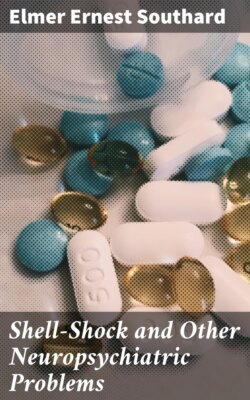Читать книгу Shell-Shock and Other Neuropsychiatric Problems - Elmer Ernest Southard - Страница 81
На сайте Литреса книга снята с продажи.
ОглавлениеEpilepsy of emotional origin.
Case 73. (Westphal and Hübner, April, 1915.)
A lieutenant without neuropathic tendencies (except that his mother was in a hospital for the insane) was under shell fire for some time. Finally, a shell burst near him, whereupon headaches and transient spells of confusion followed. Shortly upon the news of the death of his Major, he had a spell of violent excitement and confusion, dancing about on the ground and breaking things up. He passed into a stuporous condition with a suggestion of catatonia. There were a few isolated delusions to the effect that he was poisoned. After sleeping a long time, he suddenly cleared up. There was an extensive amnesia covering a period of weeks. He had forgotten the Major’s death and everything thereafter. He complained of headache, difficulty of thinking, and forgetfulness. An agoraphobia developed, as well as great sensitivity to sounds, and a feeling as if the bed and surrounding barracks were moving. There were a few illusions of a visual nature. He had complete insight into his condition. Conduct was normal. There was general hyperesthesia and ageusia.
According to Westphal, this case of deep disorder of consciousness of some duration in a healthy person is probably one of a dazed state following the so-called “affect epilepsy.”
Is Case 73 Shell-shock? Note that, in Case 73, the shell explosion at first occasioned mere headaches and confusional spells. The true occasion of the convulsions appears to have been the news of the death of a superior officer. It is, of course, possible that the transient spells of confusion were actually epileptic equivalents. Lépine remarks that Pierret and others, observing such spells of confusion often accompanied by agitation, have inquired whether manic depressive psychosis is not a kind of epilepsy. This question remains unresolved. These phenomena of epilepsia larvata (see also Case 81 of Juquelier and Quellien) are to be sharply distinguished from attacks of confusion occurring in pronounced epileptics. These latter attacks often follow a crisis and suggest exhaustion; sometimes they last several days.
